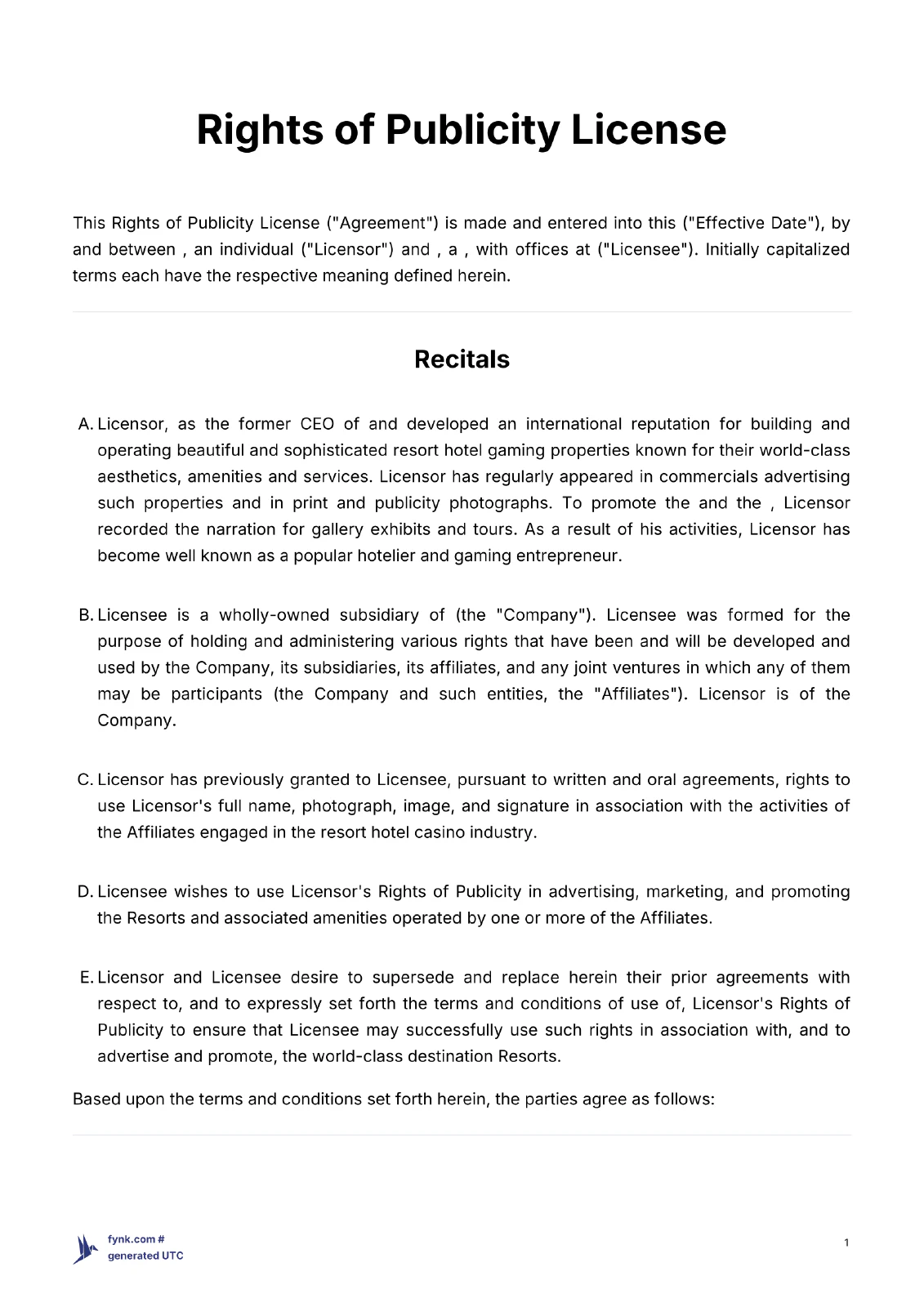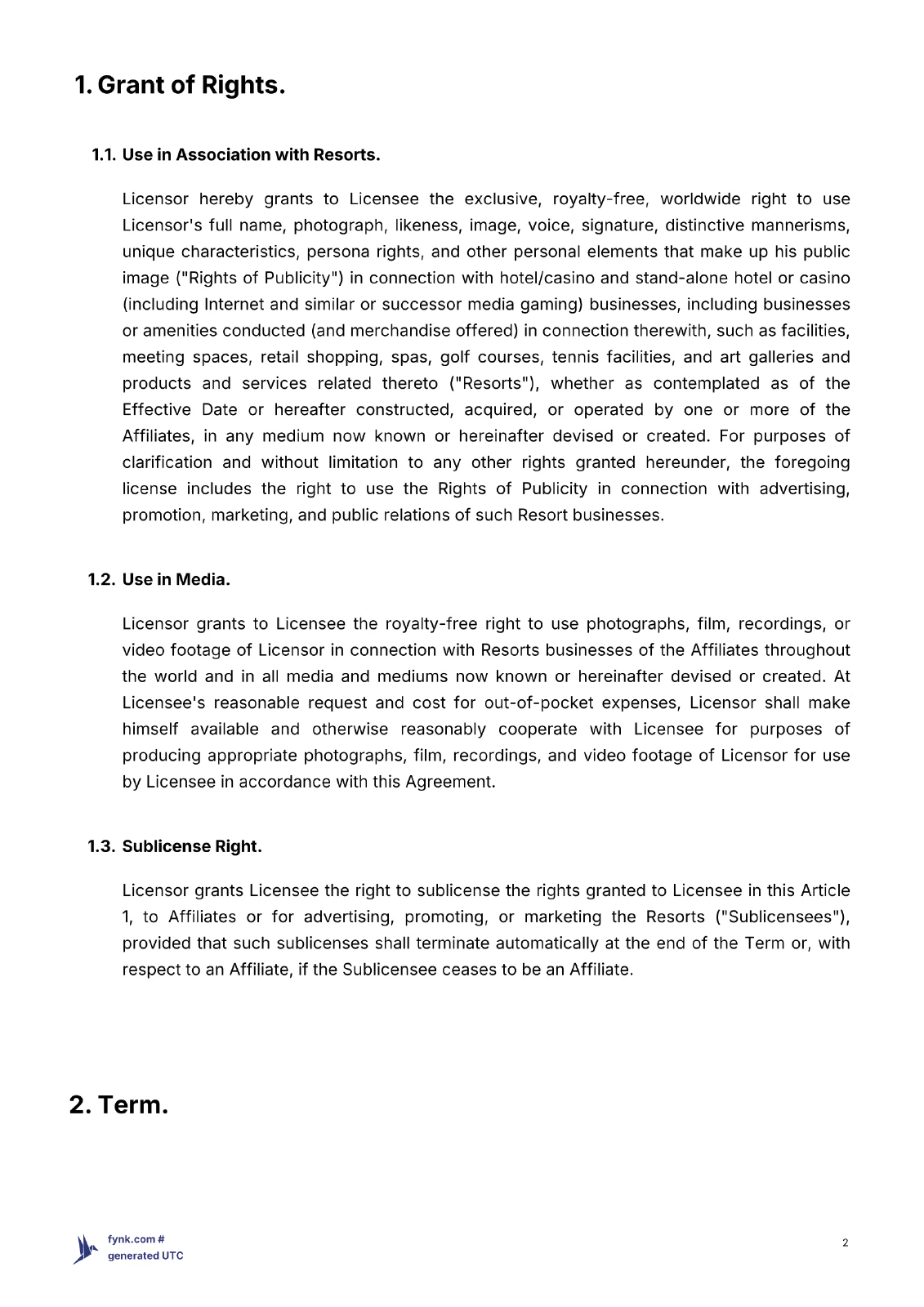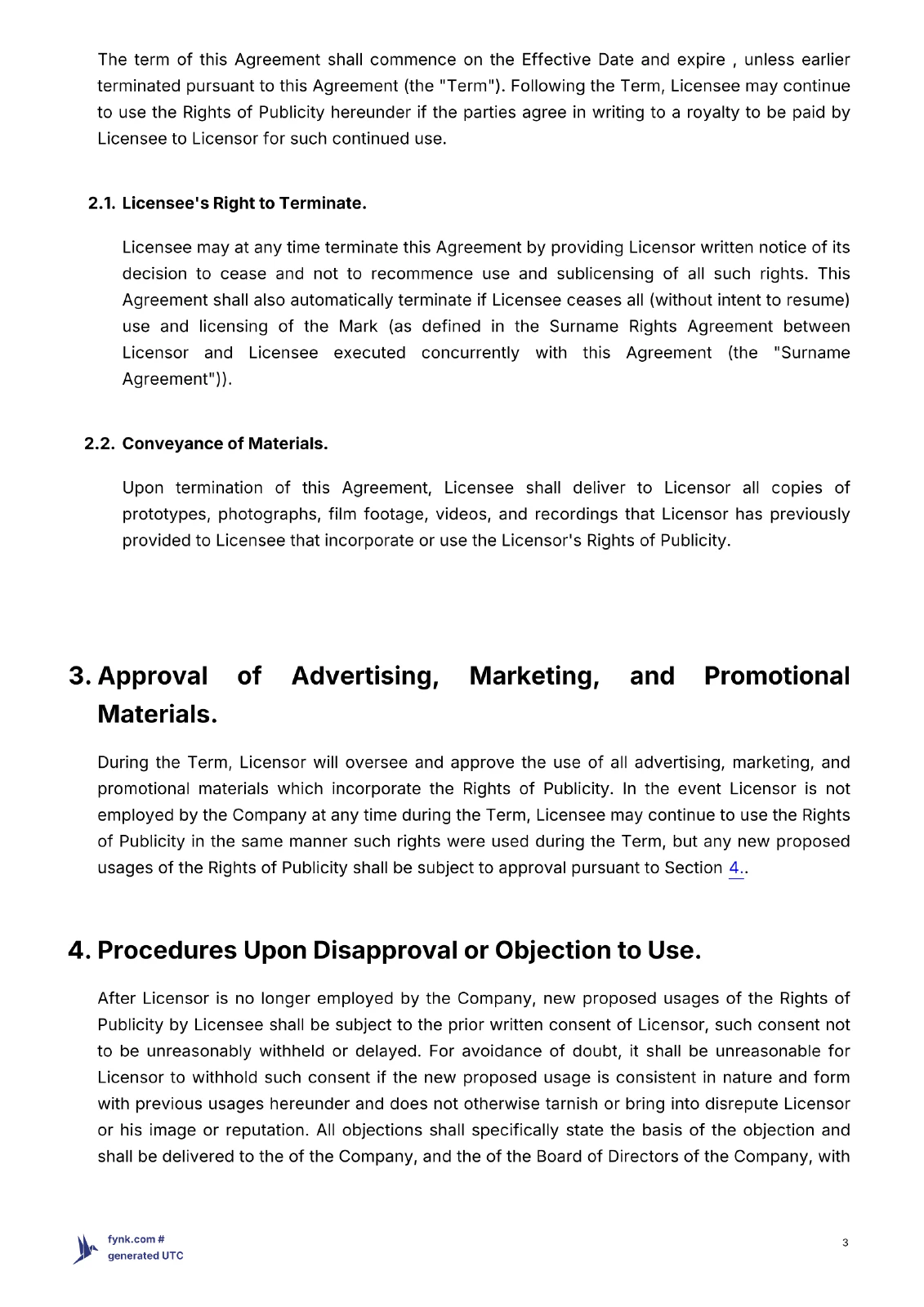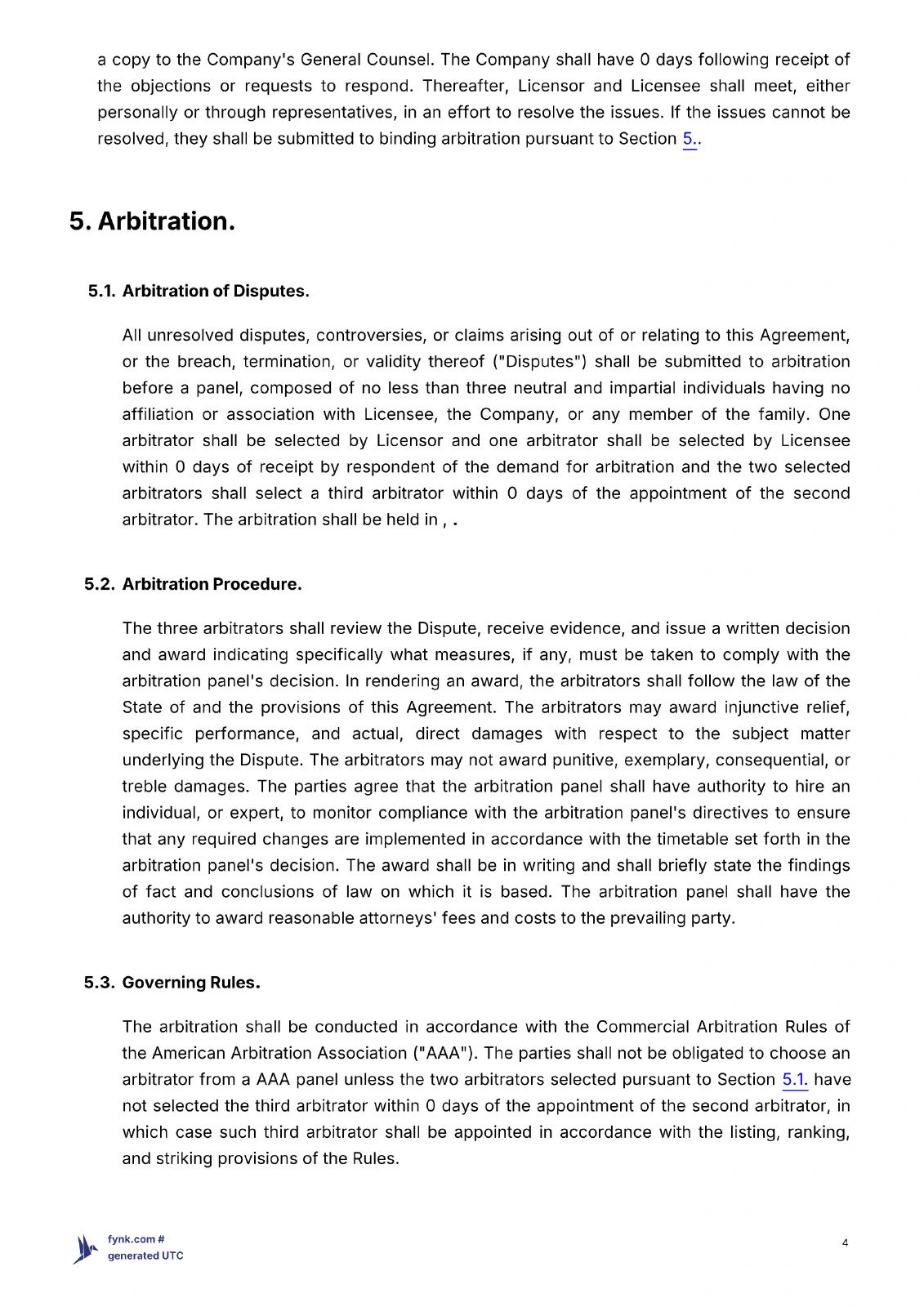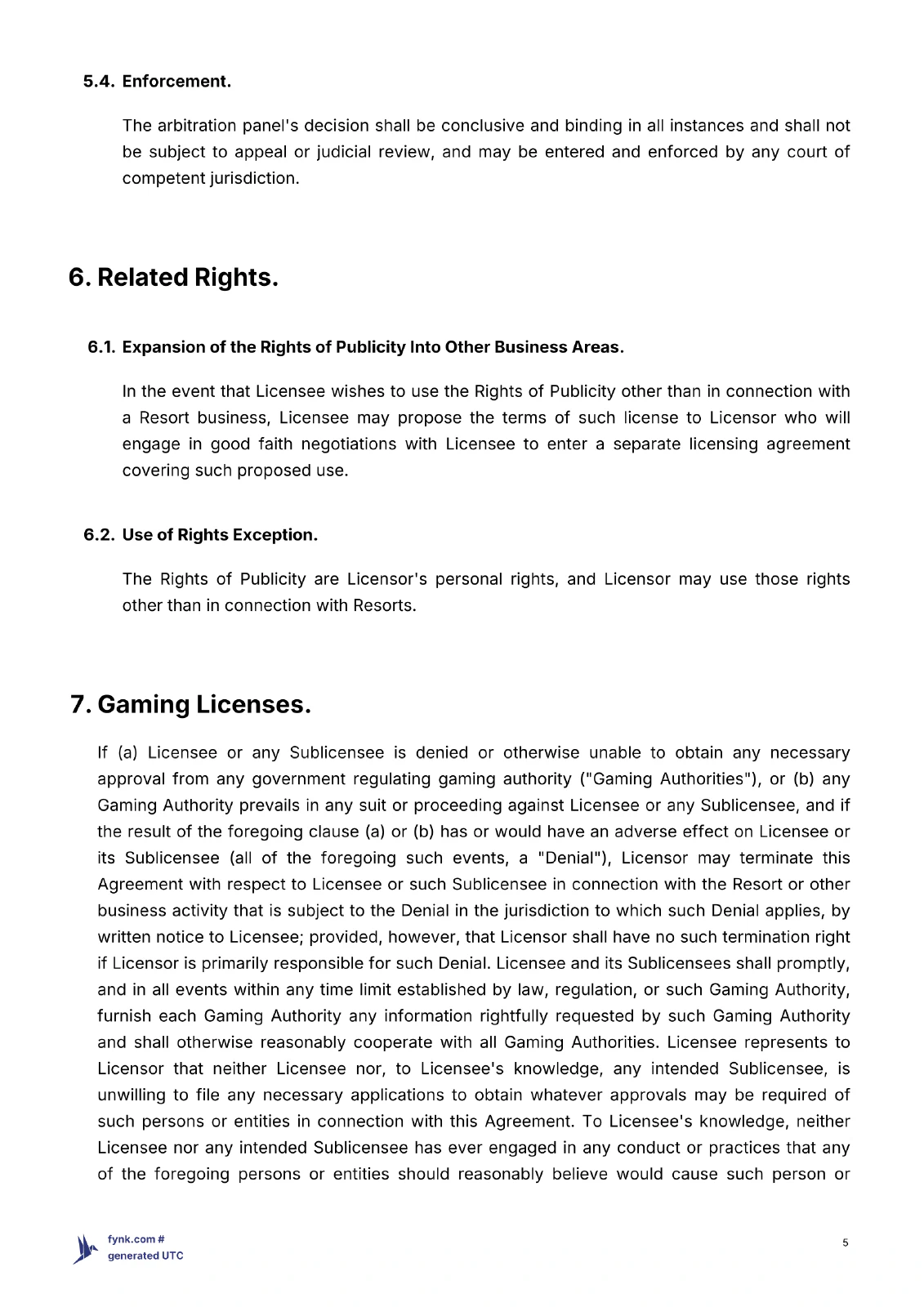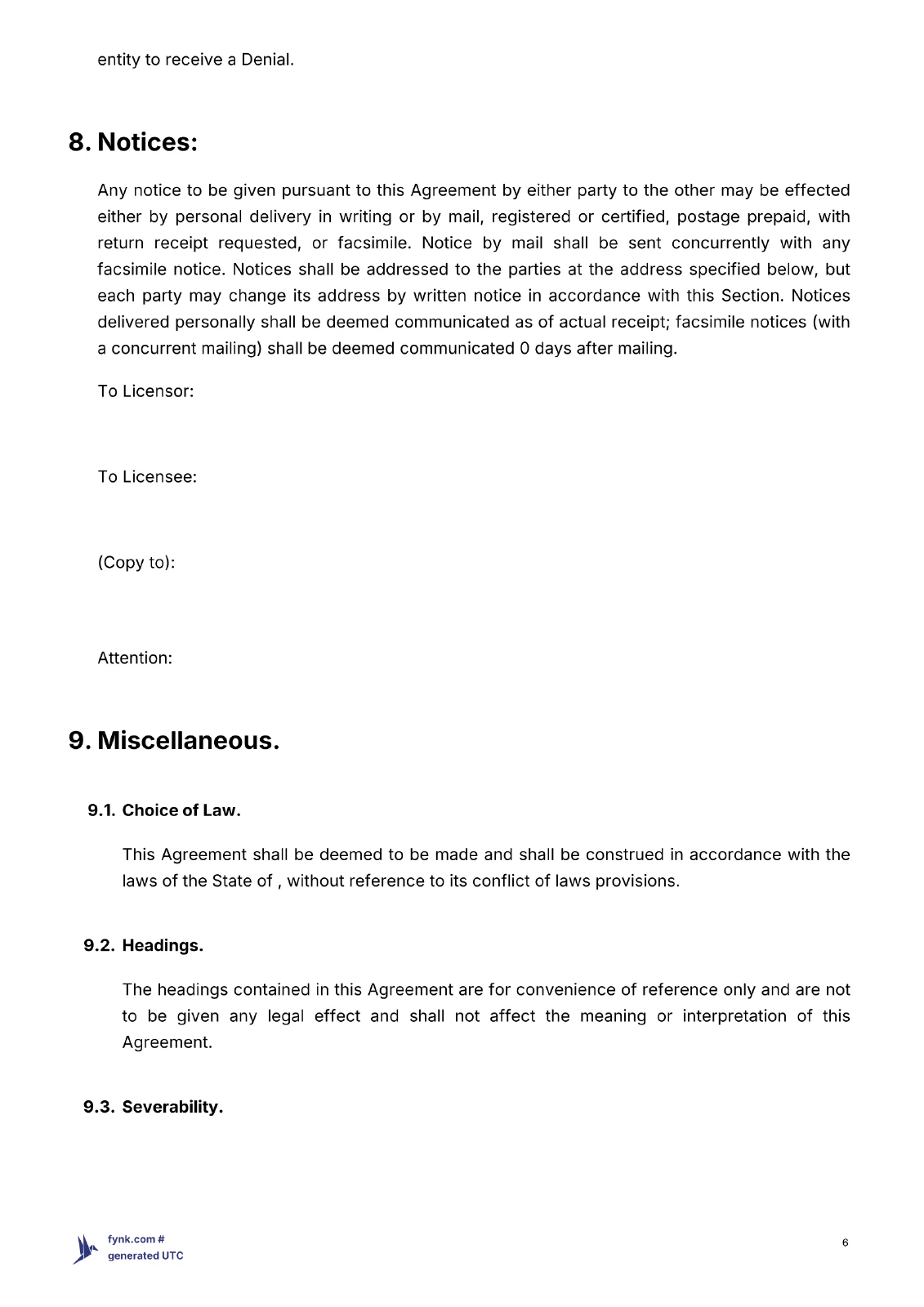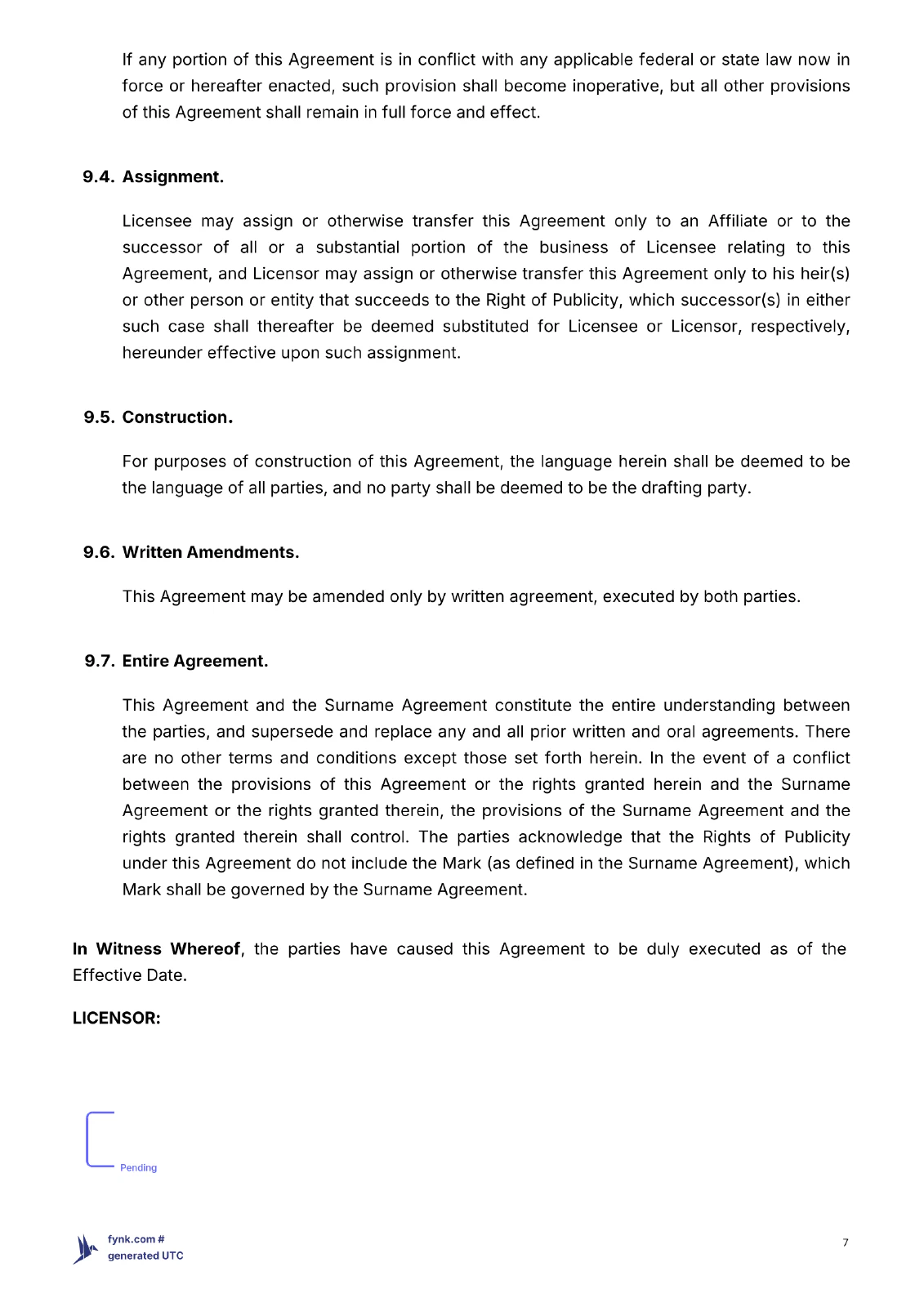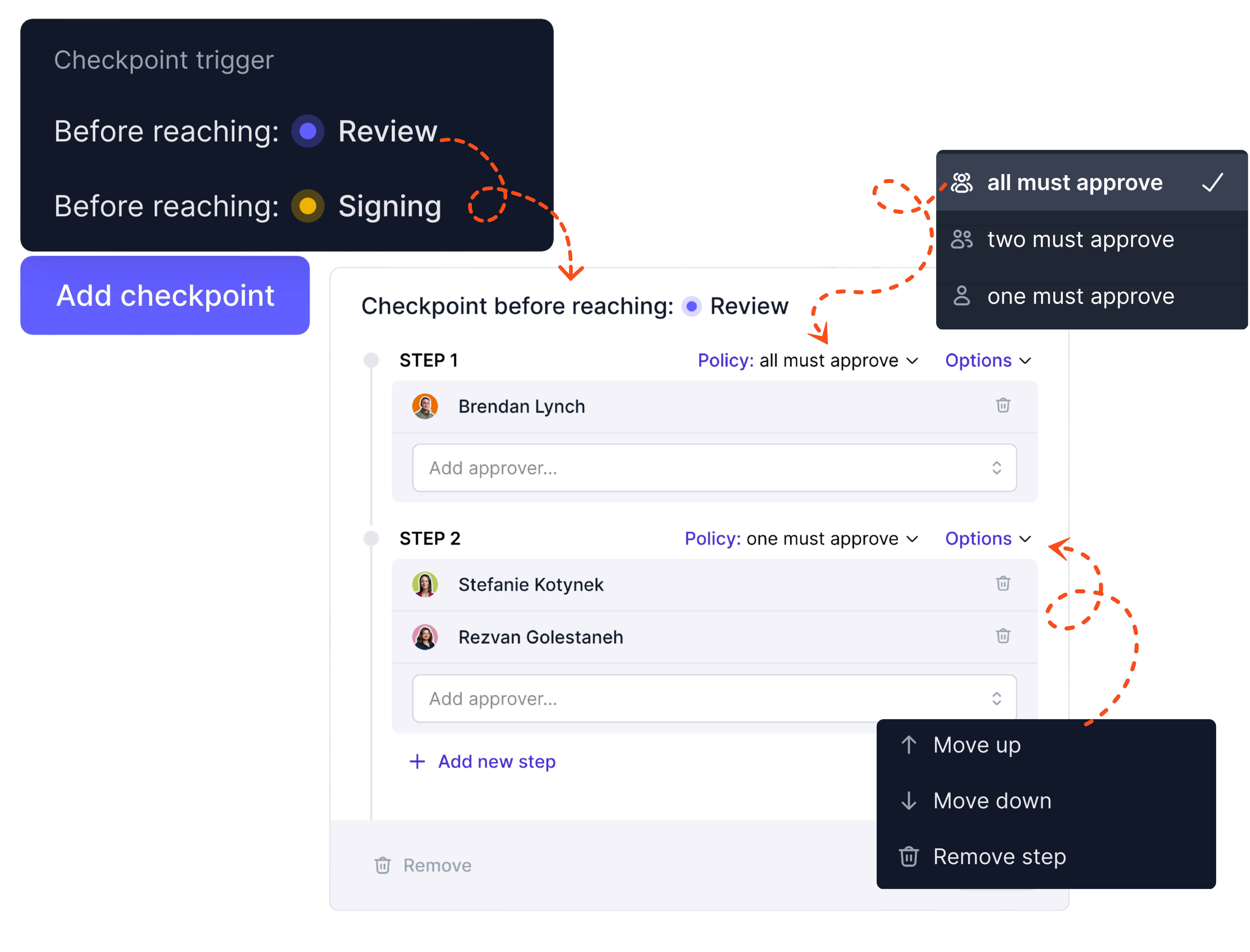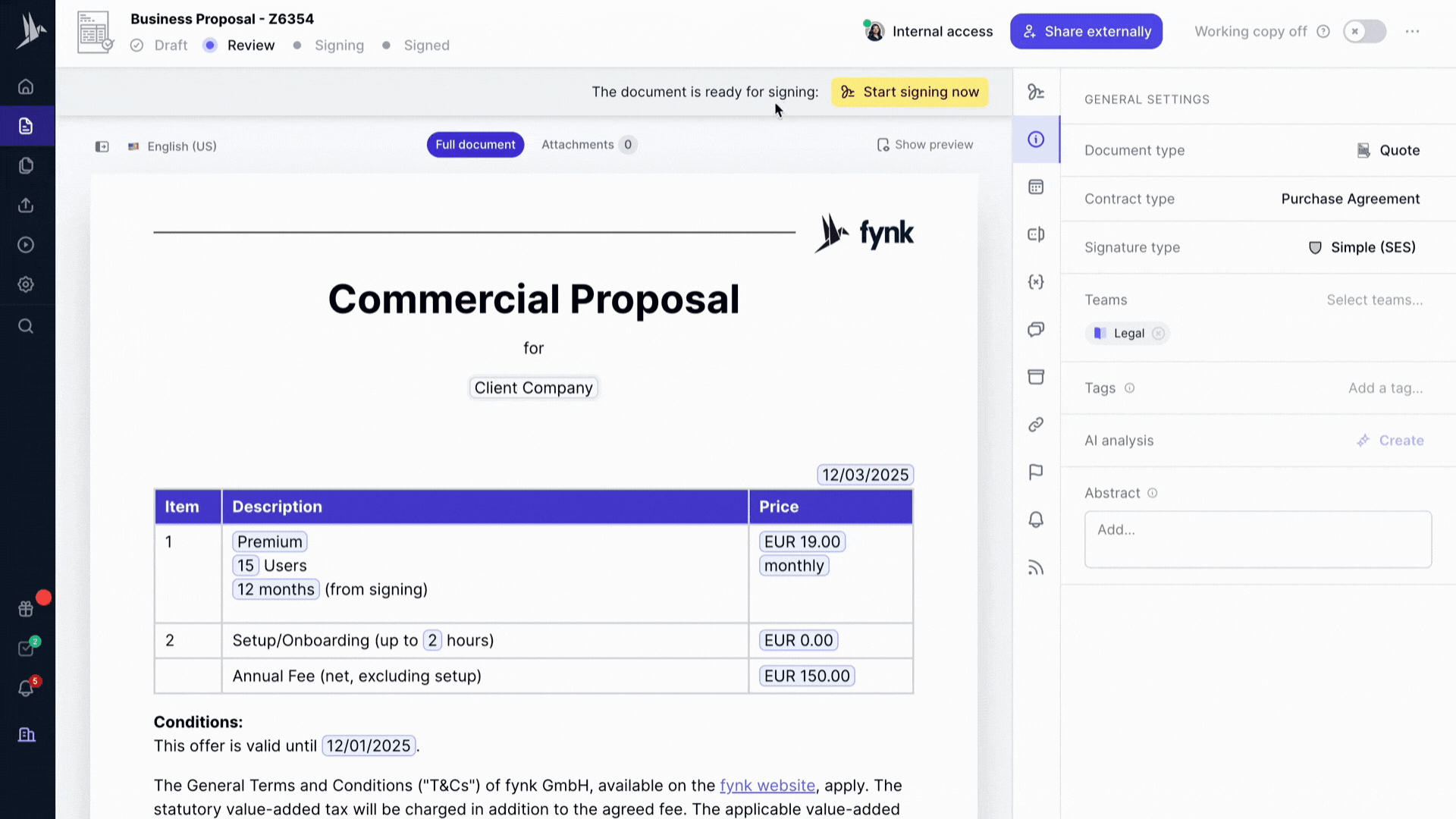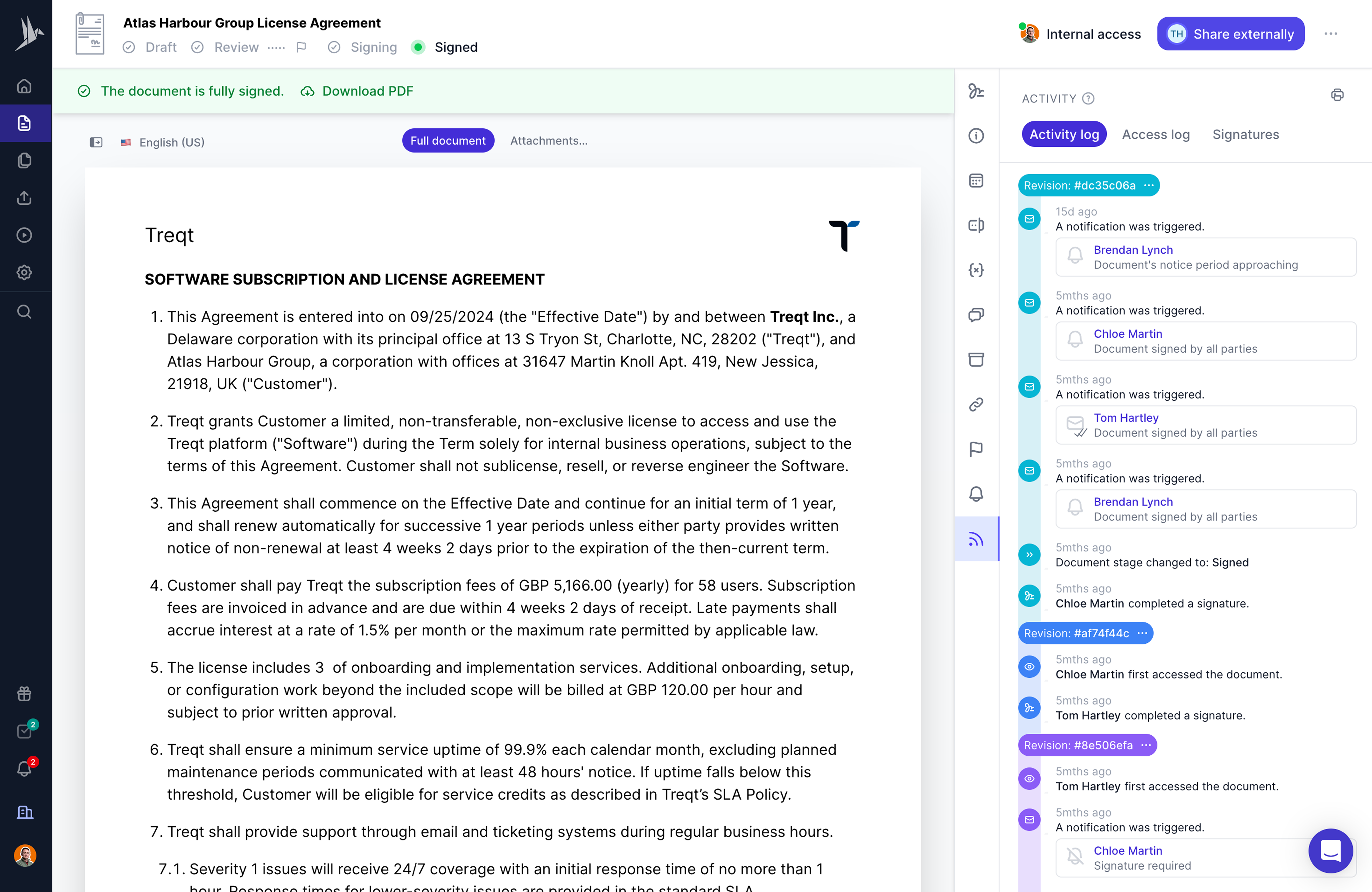Rights of Publicity License
This Rights of Publicity License ("Agreement") is made and entered into this ("Effective Date"), by and between , an individual ("Licensor") and , a , with offices at ("Licensee"). Initially capitalized terms each have the respective meaning defined herein.
Recitals
Licensor, as the former CEO of and developed an international reputation for building and operating beautiful and sophisticated resort hotel gaming properties known for their world-class aesthetics, amenities and services. Licensor has regularly appeared in commercials advertising such properties and in print and publicity photographs. To promote the and the , Licensor recorded the narration for gallery exhibits and tours. As a result of his activities, Licensor has become well known as a popular hotelier and gaming entrepreneur.
Licensee is a wholly-owned subsidiary of (the "Company"). Licensee was formed for the purpose of holding and administering various rights that have been and will be developed and used by the Company, its subsidiaries, its affiliates, and any joint ventures in which any of them may be participants (the Company and such entities, the "Affiliates"). Licensor is of the Company.
Licensor has previously granted to Licensee, pursuant to written and oral agreements, rights to use Licensor's full name, photograph, image, and signature in association with the activities of the Affiliates engaged in the resort hotel casino industry.
Licensee wishes to use Licensor's Rights of Publicity in advertising, marketing, and promoting the Resorts and associated amenities operated by one or more of the Affiliates.
Licensor and Licensee desire to supersede and replace herein their prior agreements with respect to, and to expressly set forth the terms and conditions of use of, Licensor's Rights of Publicity to ensure that Licensee may successfully use such rights in association with, and to advertise and promote, the world-class destination Resorts.
Based upon the terms and conditions set forth herein, the parties agree as follows:
Grant of Rights.
Use in Association with Resorts.
Licensor hereby grants to Licensee the exclusive, royalty-free, worldwide right to use Licensor's full name, photograph, likeness, image, voice, signature, distinctive mannerisms, unique characteristics, persona rights, and other personal elements that make up his public image ("Rights of Publicity") in connection with hotel/casino and stand-alone hotel or casino (including Internet and similar or successor media gaming) businesses, including businesses or amenities conducted (and merchandise offered) in connection therewith, such as facilities, meeting spaces, retail shopping, spas, golf courses, tennis facilities, and art galleries and products and services related thereto ("Resorts"), whether as contemplated as of the Effective Date or hereafter constructed, acquired, or operated by one or more of the Affiliates, in any medium now known or hereinafter devised or created. For purposes of clarification and without limitation to any other rights granted hereunder, the foregoing license includes the right to use the Rights of Publicity in connection with advertising, promotion, marketing, and public relations of such Resort businesses.
Use in Media.
Licensor grants to Licensee the royalty-free right to use photographs, film, recordings, or video footage of Licensor in connection with Resorts businesses of the Affiliates throughout the world and in all media and mediums now known or hereinafter devised or created. At Licensee's reasonable request and cost for out-of-pocket expenses, Licensor shall make himself available and otherwise reasonably cooperate with Licensee for purposes of producing appropriate photographs, film, recordings, and video footage of Licensor for use by Licensee in accordance with this Agreement.
Sublicense Right.
Licensor grants Licensee the right to sublicense the rights granted to Licensee in this Article 1, to Affiliates or for advertising, promoting, or marketing the Resorts ("Sublicensees"), provided that such sublicenses shall terminate automatically at the end of the Term or, with respect to an Affiliate, if the Sublicensee ceases to be an Affiliate.
Term.
The term of this Agreement shall commence on the Effective Date and expire , unless earlier terminated pursuant to this Agreement (the "Term"). Following the Term, Licensee may continue to use the Rights of Publicity hereunder if the parties agree in writing to a royalty to be paid by Licensee to Licensor for such continued use.
Licensee's Right to Terminate.
Licensee may at any time terminate this Agreement by providing Licensor written notice of its decision to cease and not to recommence use and sublicensing of all such rights. This Agreement shall also automatically terminate if Licensee ceases all (without intent to resume) use and licensing of the Mark (as defined in the Surname Rights Agreement between Licensor and Licensee executed concurrently with this Agreement (the "Surname Agreement")).
Conveyance of Materials.
Upon termination of this Agreement, Licensee shall deliver to Licensor all copies of prototypes, photographs, film footage, videos, and recordings that Licensor has previously provided to Licensee that incorporate or use the Licensor's Rights of Publicity.
Approval of Advertising, Marketing, and Promotional Materials.
During the Term, Licensor will oversee and approve the use of all advertising, marketing, and promotional materials which incorporate the Rights of Publicity. In the event Licensor is not employed by the Company at any time during the Term, Licensee may continue to use the Rights of Publicity in the same manner such rights were used during the Term, but any new proposed usages of the Rights of Publicity shall be subject to approval pursuant to Section 4..
Procedures Upon Disapproval or Objection to Use.
After Licensor is no longer employed by the Company, new proposed usages of the Rights of Publicity by Licensee shall be subject to the prior written consent of Licensor, such consent not to be unreasonably withheld or delayed. For avoidance of doubt, it shall be unreasonable for Licensor to withhold such consent if the new proposed usage is consistent in nature and form with previous usages hereunder and does not otherwise tarnish or bring into disrepute Licensor or his image or reputation. All objections shall specifically state the basis of the objection and shall be delivered to the of the Company, and the of the Board of Directors of the Company, with a copy to the Company's General Counsel. The Company shall have 0 days following receipt of the objections or requests to respond. Thereafter, Licensor and Licensee shall meet, either personally or through representatives, in an effort to resolve the issues. If the issues cannot be resolved, they shall be submitted to binding arbitration pursuant to Section 5..
Arbitration.
Arbitration of Disputes.
All unresolved disputes, controversies, or claims arising out of or relating to this Agreement, or the breach, termination, or validity thereof ("Disputes") shall be submitted to arbitration before a panel, composed of no less than three neutral and impartial individuals having no affiliation or association with Licensee, the Company, or any member of the family. One arbitrator shall be selected by Licensor and one arbitrator shall be selected by Licensee within 0 days of receipt by respondent of the demand for arbitration and the two selected arbitrators shall select a third arbitrator within 0 days of the appointment of the second arbitrator. The arbitration shall be held in , .
Arbitration Procedure.
The three arbitrators shall review the Dispute, receive evidence, and issue a written decision and award indicating specifically what measures, if any, must be taken to comply with the arbitration panel's decision. In rendering an award, the arbitrators shall follow the law of the State of and the provisions of this Agreement. The arbitrators may award injunctive relief, specific performance, and actual, direct damages with respect to the subject matter underlying the Dispute. The arbitrators may not award punitive, exemplary, consequential, or treble damages. The parties agree that the arbitration panel shall have authority to hire an individual, or expert, to monitor compliance with the arbitration panel's directives to ensure that any required changes are implemented in accordance with the timetable set forth in the arbitration panel's decision. The award shall be in writing and shall briefly state the findings of fact and conclusions of law on which it is based. The arbitration panel shall have the authority to award reasonable attorneys' fees and costs to the prevailing party.
Governing Rules.
The arbitration shall be conducted in accordance with the Commercial Arbitration Rules of the American Arbitration Association ("AAA"). The parties shall not be obligated to choose an arbitrator from a AAA panel unless the two arbitrators selected pursuant to Section 5.1. have not selected the third arbitrator within 0 days of the appointment of the second arbitrator, in which case such third arbitrator shall be appointed in accordance with the listing, ranking, and striking provisions of the Rules.
Enforcement.
The arbitration panel's decision shall be conclusive and binding in all instances and shall not be subject to appeal or judicial review, and may be entered and enforced by any court of competent jurisdiction.
Related Rights.
Expansion of the Rights of Publicity Into Other Business Areas.
In the event that Licensee wishes to use the Rights of Publicity other than in connection with a Resort business, Licensee may propose the terms of such license to Licensor who will engage in good faith negotiations with Licensee to enter a separate licensing agreement covering such proposed use.
Use of Rights Exception.
The Rights of Publicity are Licensor's personal rights, and Licensor may use those rights other than in connection with Resorts.
Gaming Licenses.
If (a) Licensee or any Sublicensee is denied or otherwise unable to obtain any necessary approval from any government regulating gaming authority ("Gaming Authorities"), or (b) any Gaming Authority prevails in any suit or proceeding against Licensee or any Sublicensee, and if the result of the foregoing clause (a) or (b) has or would have an adverse effect on Licensee or its Sublicensee (all of the foregoing such events, a "Denial"), Licensor may terminate this Agreement with respect to Licensee or such Sublicensee in connection with the Resort or other business activity that is subject to the Denial in the jurisdiction to which such Denial applies, by written notice to Licensee; provided, however, that Licensor shall have no such termination right if Licensor is primarily responsible for such Denial. Licensee and its Sublicensees shall promptly, and in all events within any time limit established by law, regulation, or such Gaming Authority, furnish each Gaming Authority any information rightfully requested by such Gaming Authority and shall otherwise reasonably cooperate with all Gaming Authorities. Licensee represents to Licensor that neither Licensee nor, to Licensee's knowledge, any intended Sublicensee, is unwilling to file any necessary applications to obtain whatever approvals may be required of such persons or entities in connection with this Agreement. To Licensee's knowledge, neither Licensee nor any intended Sublicensee has ever engaged in any conduct or practices that any of the foregoing persons or entities should reasonably believe would cause such person or entity to receive a Denial.
Notices:
Any notice to be given pursuant to this Agreement by either party to the other may be effected either by personal delivery in writing or by mail, registered or certified, postage prepaid, with return receipt requested, or facsimile. Notice by mail shall be sent concurrently with any facsimile notice. Notices shall be addressed to the parties at the address specified below, but each party may change its address by written notice in accordance with this Section. Notices delivered personally shall be deemed communicated as of actual receipt; facsimile notices (with a concurrent mailing) shall be deemed communicated 0 days after mailing.
To Licensor:
To Licensee:
(Copy to):
Attention:
Miscellaneous.
Choice of Law.
This Agreement shall be deemed to be made and shall be construed in accordance with the laws of the State of , without reference to its conflict of laws provisions.
Headings.
The headings contained in this Agreement are for convenience of reference only and are not to be given any legal effect and shall not affect the meaning or interpretation of this Agreement.
Severability.
If any portion of this Agreement is in conflict with any applicable federal or state law now in force or hereafter enacted, such provision shall become inoperative, but all other provisions of this Agreement shall remain in full force and effect.
Assignment.
Licensee may assign or otherwise transfer this Agreement only to an Affiliate or to the successor of all or a substantial portion of the business of Licensee relating to this Agreement, and Licensor may assign or otherwise transfer this Agreement only to his heir(s) or other person or entity that succeeds to the Right of Publicity, which successor(s) in either such case shall thereafter be deemed substituted for Licensee or Licensor, respectively, hereunder effective upon such assignment.
Construction.
For purposes of construction of this Agreement, the language herein shall be deemed to be the language of all parties, and no party shall be deemed to be the drafting party.
Written Amendments.
This Agreement may be amended only by written agreement, executed by both parties.
Entire Agreement.
This Agreement and the Surname Agreement constitute the entire understanding between the parties, and supersede and replace any and all prior written and oral agreements. There are no other terms and conditions except those set forth herein. In the event of a conflict between the provisions of this Agreement or the rights granted herein and the Surname Agreement or the rights granted therein, the provisions of the Surname Agreement and the rights granted therein shall control. The parties acknowledge that the Rights of Publicity under this Agreement do not include the Mark (as defined in the Surname Agreement), which Mark shall be governed by the Surname Agreement.
In Witness Whereof, the parties have caused this Agreement to be duly executed as of the Effective Date.
LICENSOR:
LICENSEE:

